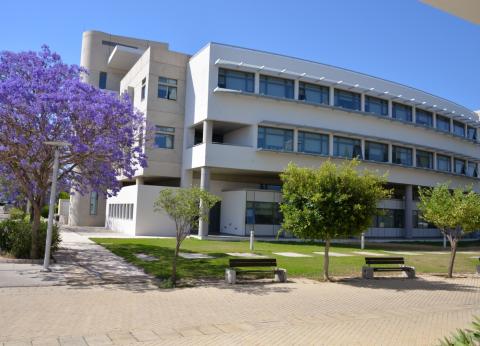University of Cyprus, Department of Physics
Institute

University of Cyprus
Department of Physics
1,Panepistimiou Street
2109
Aglantzia,Nicosia
Cyprus
+357 22892820 or +357 22892826

University of Cyprus
Department of Physics
1,Panepistimiou Street
2109
Aglantzia,Nicosia
Cyprus
+357 22892820 or +357 22892826
The University of Cyprus has recently constructed a new University Campus, which covers an area of approximately 1 square km. It consists of academic buildings, sports facilities and student residences, and by 2020 it will accommodate up to 9 000 students. These facilities host the Faculty of Pure and Applied Sciences, including all teaching and research activities of the Department of Physics.
One of the first to be completed, the Department of Physics provides modern premises, state-of-the-art computing facilities and cutting-edge laboratories for teaching and scientific research. Besides undergraduate studies, the Department also offers graduate programs leading to M.Sc. and Ph.D. degrees with the main aim being to promote research and knowledge in the area of Physics. Special emphasis is placed on balanced learning both from classroom and laboratory. Graduates of the Department will be qualified to seek employment in industry, carry out research in institutions in Cyprus and abroad, or teach in secondary education.
Research is conducted in areas of both Fundamental and Applied Physics, in Theory as well as Experiment, with important international collaborations with world-renowned Research Centers and Universities. In Experimental Physics, the Physics Department has dedicated groups that conduct research related to High-Energy Physics (HEP), Nuclear Physics, Photothermal Sciences and Ultrafast Sciences. The Theoretical Physics research focuses mainly on Biophysics, Condensed Matter Physics, Strong Interaction Physics including Lattice QCD, and High-Energy Physics and Cosmology.
The UCY HEP has important contributions in advancing the forefront of scientific research. It was an active member of the L3 Collaboration at the LEP Collider at CERN, and the CDF Collaboration at the Tevatron. The group joined the CMS Collaboration in 1995 and in 1999 joined efforts in manufacturing the barrel yoke and the vacuum tank of the CMS solenoid magnet, which is now part of the CMS Experiment. The members of the UCY HEP group have also participated in the construction of the CMS ECAL and developed specialized equipment for performing control and calibration tests of its Very Front-End electronics boards. The UCY HEP group research activities include searches for light charged Higgs bosons, multi-muon production and other exotic particles, heavy flavour and BSM Physics in including SUSY and Extra Dimensions, Inflation and Baryogenesis models. The group has had significant input towards novel techniques for HCALs with excellent energy resolution for future HEP Experiments, as well as major contributions to the CMS Tracker development and maintenance. In 2012 the Republic of Cyprus was accepted as a CERN Associate Member State while in early 2014 the UCY HEP Group joined global efforts to replace the central tracker of CMS for the High-Luminosity LHC programme and to develop innovative techniques for selecting tau-jets with CMS. This will allow for a new Track-Trigger to be developed, thus contributing to the rich HL-LHC physics program.

